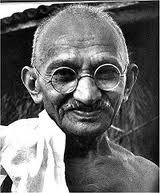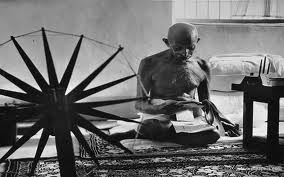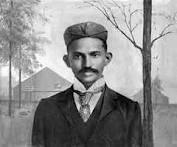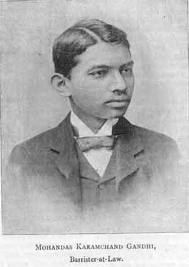 |
| Mahatma Gandhi on an average day (http://en.wikipedia.org/wiki/Mohandas_Karamchand_Gandhi ()) |
"Generations to come will scarce believe that such a man as this ever in flesh and blood walked upon this earth." Albert Einstein proclaimed this at the funeral of Mohandas Karamchand Gandhi; this powerful statement testifies to the life of this humble unassuming man dressed in a loin cloth. Mohandas Karamchand Gandhi, more reverently referred to as Mahatma, meaning great soul, catapulted the millions of masses in India from colonization by the British Empire, to freedom. Born in Porbandar, Kathiawar, India, on October 2, 1869, Gandhi grew up in a devout Hindu household, a dominant religion in India. The upbringing Gandhi received from his father, who respected all religions, provided him with his formative experiences in religious tolerance. After studying law in Britain, Gandhi spent his early adulthood as a lawyer in South Africa, where he became aware of the discrimination against people of color in South African society. The British government's unjust policies provided the catalyst that sparked his fight for justice. Here, Gandhi first succeeded in adopting the principle of non-violence as a tool for resistance. After achieving justice for his compatriots in South Africa, Gandhi used this same principle of non-violent protest as his cornerstone in securing freedom for India. In his quest for freedom and justice for India, Mahatma Gandhi displayed peacefulness, perseverance, and tolerance, making him a true inspiration and hero.
 |
| Gandhi Weaving his clothes (http://www.moviepostershut.com/mahatma-gandhi-university-btech-amp-bcom-exam-result-november-2009/666kb.com%7Ci%7Cbe2vhk5geqbhzjstk.jpg/pJefn5ufppSjoJmkpw.html ()) |
Gandhi's adoption of nonviolence as his foundation to achieve freedom, even in the face of torture, makes him an admirable role model. Gandhi's resolve for peace became apparent when he withstood dozens of beatings and jailings without for one moment inflicting any wound on his tormentors. He also urged his followers to adopt his philosophy of non-violence, even in the face of suffering bodily harm: "On September 1, 1947, after an angry Hindu mob broke into the home where he was staying in Calcutta, Gandhi began to fast, " to end only if and when sanity returns to Calcutta." Both Hindu and Muslim leaders promised that there would be no more killings, and Gandhi ended his fast" ("Mohandas 2 Karamchand Gandhi."). Gandhi's ability to sacrifice himself demonstrated that he cared more about the well-being of others than his own. Whenever faced with a conflict, Gandhi used fasting as a peaceful means of resolving the issue. These selfless qualities drew the Indian masses towards him. Although the people considered him their leader, and gave him the title "Father of the Nation", he led a simple life: "He believed in nonviolence and taught that to be truly nonviolent required courage. He lived a simple life and thought it was wrong to kill animals for food or clothing" ("Gandhi, Mohandas Karamchand."). Although he grew up in affluence, he abandoned his wealth and lived a simple life, becoming a symbol for peace and altruism.
 |
| Gandhi in South Africa as a Lawyer (http://2pat.wordpress.com/2008/11/25/mahatma-gandhi/ ()) |
With Gandhi's peaceful protests came seemingly insurmountable challenges, but due to his immense perseverance he overcame them all, ultimately freeing India from her shackles of slavery. Gandhi's perseverance became evident early in his life: "In 1893, Gandhi went to South Africa to do some legal work. South Africa was then under British control. Almost immediately, he was abused because he was an Indian who claimed his rights as a British subject. He saw that all Indians suffered from discrimination. His law assignment was for one year, but he stayed in South Africa for 21 years to work for Indian rights" ("Gandhi, Mohandas Karamchand."). By staying in South Africa to advocate for Indian civil rights, Gandhi showed his capacity to stick with a task until its completion. Not only did he envision his ideals, but he also followed them through until their fruition. This innate ability to see everything through proved to be vital in his struggles against the British government. As he continued his struggle for equality, he faced strong opposition, which only strengthened his resolve: "Gandhi launched a fast-unto-death, determined to sacrifice his life rather than allow "perfidious Albion" further to divide and thus longer to rule over India's "enslaved" population. He thus brilliantly united his religious and political powers, magnifying the force of each, forcing the Raj withdraw its "Communal Award," rather than to risk allowing a Mahatma to die protesting it" (Wolpert, Stanley.). Without his seemingly fathomless levels of perseverance, Gandhi's struggles would have been in vain. Due to his incredible perseverance, even in the face of death, Gandhi overcame formidable, and many impossible challenges.
 |
| Gandhi as a child (http://xlcgozo.com/SOLAR-ENERGY/HELIONAL-INDASTRIAL/childhood-gandhi&page=2 ()) |
Gandhi's ability to accept all human beings as equals made him a pioneer. In spite of being born in a Hindu household, Gandhi's religious tolerance gave him the ability to reject "age long prejudices" that existed between Hindu's and Muslims. "On Jan. 13, 1948, at the age of 78, Gandhi began his last fast. His purpose was to end the bloodshed among Hindu, Muslim, and other groups. On January 18, their leaders pledged to stop fighting and Gandhi broke his fast" ("Gandhi, Mohandas Karamchand."). Gandhi remained impartial and did not allow bias to obscure his vision. In a society greatly divided by religion and the caste system, Gandhi alone embraced everyone, even the so called 'Untouchables' of society: "'Untouchability is a blot upon humanity and therefore upon Hinduism,' Gandhi argued, leading several important struggles against that Hindu "caste" crime, which treated some 10 percent of India's Hindu population as "polluted outcastes,"" (Wolpert, Stanley.). Untouchability had been around for generations, but that did not stop Gandhi from fighting against it. He fought for the rights of the "untouchables" until they received equal treatment, even at the risk of being secluded himself. Gandhi's ability to accept all members of society as equals in the face of rejection by his own, makes him a true leader.
Mahatma Gandhi led a righteous life, always attracting masses of followers, but never striving for them. During his quest for equal and just treatment for all, Mahatma Gandhi displayed peacefulness, perseverance, and tolerance. Throughout his life, Gandhi advocated for the rights of the oppressed. He called for just governments, and brought about change through non-violence. This, with his immense perseverance, allowed him to capture the world's attention. Not only did his message of freedom by nonviolence resonate in India, but it also inspired other global leaders influencing Nelson Mandela and Martin Luther King Junior through their own freedom struggles. In his fight for civil rights, Mr. King argued that Gandhi's principle of non-violence stood as: "the only morally and practically sound method open to oppressed people in their struggle for freedom"("Gandhi, Mohandas Karamchand (1869-1948)."). Mahatma Gandhi inspires me through his simplicity, tenacity and his righteous ideals. His philosophy of non-violence revolutionized the world. Thus the famous scientist Albert Einstein proclaimed that generations would not be able to fathom a man such as Gandhi. Simple, yet hard to ignore; frail in frame, but powerful enough to bring an Empire to its knees with a revolutionary message of non-violence; these are the characteristics of Mahatma Gandhi, my hero.
"Gandhi, Mohandas Karamchand." World Book Advanced. World Book, 2012. Web. 26 Mar. 2012.
Wolpert, Stanley. "Gandhi, Mahatma M. K." Encyclopedia of India. Ed. Stanley Wolpert. Vol. 2. Detroit: Charles Scribner's Sons, 2006. 119-125. Gale Virtual Reference Library. Web. 28 Mar. 2012.
"Gandhi, Mohandas Karamchand (1869-1948)." King Institute Home. Web. 14 Apr. 2012.
Page created on 4/22/2012 12:00:00 AM
Last edited 4/22/2012 12:00:00 AM
